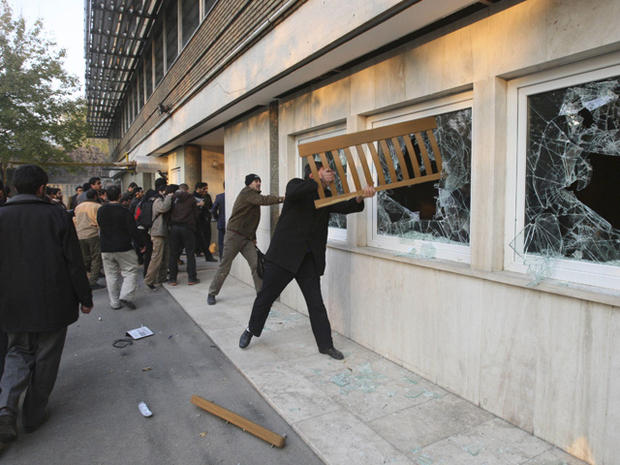Iran students storm U.K. Embassy in Tehran
Last Updated 3:11 p.m. ET
TEHRAN - Hard-line Iranian students stormed British diplomatic sites in Tehran on Tuesday, bringing down the Union Jack flag, burning an embassy vehicle and throwing documents from windows in scenes reminiscent of the seizing of the U.S. compound in 1979.
The act drew a sharp rebuke from London. British Prime Minister David Cameron called it "outrageous and indefensible" and warned the Iranian government will face "serious consequences" for "its unacceptable failure" to protect diplomats in line with international law. He said those measures would be considered in coming days.
The mob surged past riot police into the British Embassy complex -- which they pelted with petrol bombs and stones -- two days after Iran's parliament approved a bill that reduces diplomatic relations with Britain following London's support of recently upgraded Western sanctions on Tehran over its disputed nuclear program. Flames shot out of a sport utility vehicle parked outside the brick building.
Demonstrators outside the embassy also burned British flags and clashed with police as the rally, which had been organized by student groups at universities and seminaries.
Less than two hours later, police appeared to regain control of the site. But about 300 protesters reportedly entered a residential complex for staff in another part of the city and replaced British flags with Iranian ones.
The British Foreign Office also harshly denounced the melee.
It said a "significant number" of protesters entered the compound and caused vandalism, but gave no other details on damage.
Cameron said all embassy staff have been accounted for and praised Britain's ambassador to Iran for handling a "dangerous situation with calm and professionalism." He also said Iran's government must immediately secure Britain's compound and ensure the staff's safety.
In Washington, the White House issued a statement strongly condemning the attacks and saying Iran has an obligation to protect foreign embassies. The U.S. broke off diplomatic relations with Iran during the embassy siege in 1980.
The semiofficial Mehr news agency said embassy staff had left the compound before the mobs entered, but it also said those who occupied the area had taken six staff as hostages. It did not give their nationalities and the report was later removed from the website without elaboration.
The protesters broke through after clashing with anti-riot police and chanting for its takeover. "Death to England," some cried in the first significant assault of a foreign diplomatic area in Iran in years. More protesters poured into the compound as police tried to clear the site.
Smoke rose from some areas of the embassy grounds and the British flag was replaced with a banner in the name of 7th century Shiite saint, Imam Hussein. Occupiers also tore down picture of Queen Elizabeth II.
Protesters called for the closure of the embassy calling it a "spy den" -- the same phrase used after militants stormed the U.S. embassy in Tehran after the 1979 Islamic Revolution and held 52 hostages for 444 days. In the early moments of the siege, protesters tossed out papers from the compound and hauled down the U.S. flag. Washington and Tehran have no diplomatic relations since then.
The rally outside the British Embassy -- on a main street in Tehran downtown -- included protesters carrying photographs of nuclear scientist Majid Shahriari, who was killed last year in an attack that Iran blamed on Israeli and British spy services.
In a northern part of the city, the official IRNA news agency said about 300 protesters entered a complex used for embassy staff and other officials.
Britain's Foreign Office said it was in contact with embassy officials. Officials were still checking on the well-being of workers and diplomats, a spokeswoman said on condition of anonymity in line with standing policy.
It also warned its citizens in Iran to "stay inside and keep a low profile."
Tensions with Britain date back to the 19th century when the Persian monarchy gave huge industrial concessions to London, which later included significant control over Iran's oil industry.
But they have become increasingly strained as the West accuses Iran of trying to develop nuclear weapons -- a charge Tehran denies.
In recent years, Iran was angered by Britain's decision in 2007 honor author Salman Rushdie with a knighthood.
Rushdie went into hiding after Iran's Ayatollah Khomeini issued a 1989 fatwa, or religious edict, ordering Muslims to kill the author because his novel "The Satanic Verses" allegedly insulted Islam.
The decision shortly after Iran detained 15 British sailors and marines in March 2007 for allegedly entering the country's territorial waters in the Gulf -- a claim Britain denies. The 15 were released after nearly two weeks in captivity.
In 2006, angry mobs burned the Danish flag and attacked Danish and other Western embassies in Tehran in protest to the reprinting of a cartoon deemed insulting of the Prophet Muhammad in the Nordic country's newspapers.
